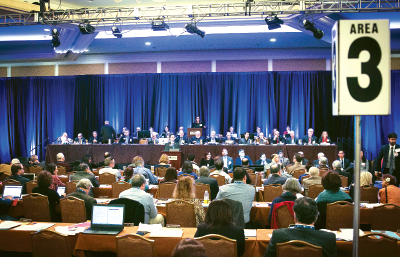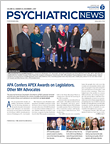The APA Assembly last month approved an action paper calling for the creation of a Council on Women’s Mental Health to address mental health conditions as they specifically impact women as well as other medical conditions that may affect women’s mental health.
Actions and resolutions approved by the Assembly do not become policy until they are approved by the APA Board of Trustees.
In addition, the Assembly voted to accept the slate of candidates running for the offices of speaker-elect and recorder and approved an action paper addressing the Joint Commission’s standards regarding “ligature” risks in psychiatric units (see story on facing page).
Nazanin E. Silver, M.D., M.P.H., the Area 3 resident and fellow member representative, was the author of the action paper calling for creation of the Council on Women’s Mental Health. She said that medical illnesses affect women and men differently and that the rates of common mental health disorders differ between men and women. Female reproductive hormones affect the production and transport of neurotransmitters responsible for mood and are implicated in mood changes in women, she said.
Prior to 2009, there was a component titled the Committee on Women that was a subcommittee under the Council on Minority Mental Health and Health Disparities. The committee was sunseted in 2009 when APA reorganized its components. At the time the Board of Trustees approved that the committee’s charge be subsumed by the Council on Minority Mental Health and Health Disparities.
Yet Silver and others who spoke for the creation of the council noted that women comprise approximately half of the U.S. population so that they are not appropriately represented as a minority group within the APA governance. Jennifer Payne, M.D., deputy representative from the Caucus of Women Psychiatrists, said the council would be the component within APA representing psychiatrists who specialize in the “management of women with psychiatric disorders throughout the life cycle.”
In related business, the Assembly voted to approve a position statement that APA recommend as a national policy 12 weeks of paid parental leave after the birth of a baby or adoption. Although the motion was opposed by some representatives who own small practices and said such a policy would be financially and logistically onerous, most representatives who spoke on the issue pointed to the positive medical and mental health benefits of paid parental leave.
Other Actions
•
The Assembly recommended adoption of an APA position statement asserting that insurance and/or other third-party utilization management and medical necessity criteria for mental illness and substance use treatment “should be developed by individuals who are trained as psychiatrists or by work groups that include psychiatrists.” If approved by the Board, the statement would also establish as APA policy that insurance and/or other third-party utilization management and medical necessity criteria for mental illness and substance use treatment should be in full compliance with requirements of state and federal parity laws, including requirements regarding quantitative limits (QTLs) and nonquantitative limits (NQTLs) for treatment.
•
The Assembly voted to approve an action paper asking APA to work with the AMA to adopt a policy that maintenance of certification (MOC) should not be a requirement for maintenance of licensure, hospital privileges, insurance credentialing, or employment. Further, the action paper asks that APA support a self-assessment CME option in lieu of the 10-year exam and encourage the American Board of Psychiatry and Neurology to accelerate the timeline for reform of the MOC process.
•
Assembly members also addressed the problem of medical licensing boards that ask candidates about a history of treatment for mental illness and substance use disorders. The Assembly approved an action paper calling on APA to query state licensing boards regarding their compliance with APA policy and with the Americans With Disabilities Act; both allow questions only about current mental and physical impairment affecting the applicant’s ability to practice medicine. Further, the action paper calls for APA to publish on its website information about state compliance with this directive. ■
APA members can access the Assembly action tracking system
here
